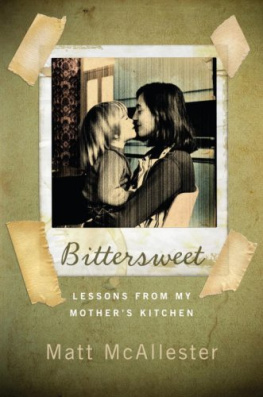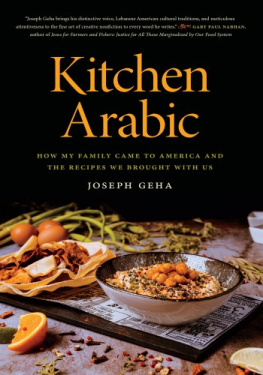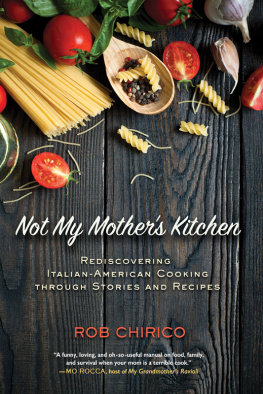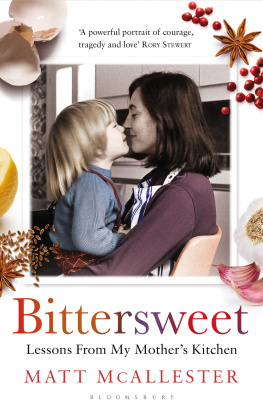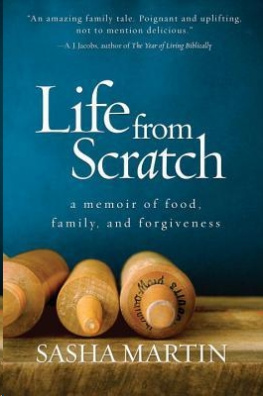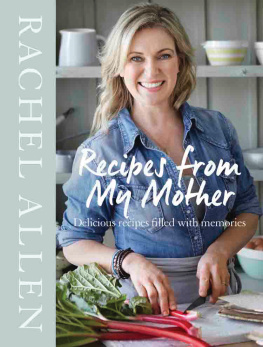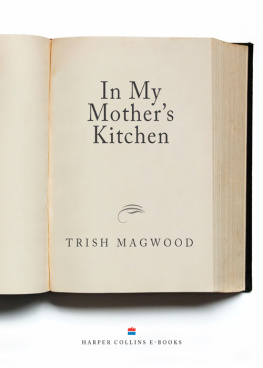About the Author

MATT MCALLESTER is a Pulitzer Prize-winning journalist who was a foreign correspondent for Newsday before returning to London, where he now lives with his wife, Pernilla. Winner of a number of other awards, including the Osborn Elliott Award for Excellence for his coverage of Nepal in 2006 and several Overseas Press Club citations for his international reporting, he is currently a contributing editor at Details.
1
 MY MOTHER SAT IN HER ARMCHAIR BY THE WINDOW AND asked me if I thought I was a good cook.
MY MOTHER SAT IN HER ARMCHAIR BY THE WINDOW AND asked me if I thought I was a good cook.
Yeah, I said. Not bad.
Do you always leave the book open?
Yes, I said.
Then you can't cook. She laughed, but she wasn't joking. If you need to keep the book open, you're not really cooking.
We had had this conversation before. It had a companion piece that went like this:
Have you read Elizabeth David yet?
No, Mum.
If you want to know how to cook, read Elizabeth David. She'll tell you everything. Read French Provincial Cooking. They're marvelous books. We all learned to cook from Elizabeth David.
This conversation I had with my mother was our shared doorway into talking about food. There was so little we could share, so few topics I could introduce without risking her anger and delusionsmy father, certain former friends, certain relatives, places we had lived, most of the past, politics, foreign affairsor without wading into the oceans of forgetfulness and obliviousness that had built up around things she once cared about and I still didbooks, movies, the news. But if I told her what I was cooking for friends over the weekend, we would fall into a safe place together, one where past, present, and future were full of afternoons in the kitchen with the radio on and with chocolate-smeared mixing bowls in the sink, desserts cooling in the refrigerator, sauces simmering on the stove, a slowly crisping, caramelizing roast in the oven, and the house full of mingling, delicious smells.
It was the lovely afternoon of May 4, 2005. The pink bunched flowers of the horse-chestnut tree outside her window in Swiss Cottage swayed gently in a spring breeze. She had not cooked for a long time, having moved from a studio apartment where she would at best fry some bacon, to a locked mental ward in an industrial corner of Northwest London, and then to this charming, sunlit room on the top floor of an old folks' home (called Rathmore House), where she was a teenager compared to the dying bodies who sat immobile in the hallway. She was closer in age to some of the staff than to the other residents, and she didn't socialize with the bent-over old ladies who stared into their ever-dimming memories. Unlike them, she would walk along the street to the local stores and cafs, sitting with a cup of coffee and making friends with the local misfits who also spent their days over coffee. She kept to her room when in the home. She read the occasional novel, watched television, and waited for phone calls and visits from my sister and me.
She hated the food there, that was the only thing, and loved to be taken out. A few days earlier, on a walk to the shops of nearby Primrose Hill with my sister, she had bought me a present. It was a zester, and she handed it to me now without wrapping paper or reason. She knew I would like it. I had another zester already, but immediately I liked this one more. It had a solid ball of steel for a handle. She had bought an identical one for my sister.
She stood up from her armchair and we kissed and I hugged her, smiling. It was an unplanned visit, an hour snatched because I happened to be at home in London rather than in a war zone and I was passing by. It had been an hour without my getting irritated, one in which I asked for and received rare maternal advice about things I have already forgotten because it was the unwonted feeling of being looked after by my mother that mattered. The zester, bought by chance in a shop on the same street as the apartment where a young Elizabeth David, my mother's cooking guru, first began to cook for herself, was in my hand as I hugged her.
I put it into my pocket and left.
She died two days later, in the morning, in that room. She fell forward onto the floor in front of her armchair, her heart stopping without warning.
2
 BY THE TIME I WAS EIGHTEEN YEARS OLD, I WANTED MY mother, who had brought me into the world and deluged me with love, to die. And I said so, out loud.
BY THE TIME I WAS EIGHTEEN YEARS OLD, I WANTED MY mother, who had brought me into the world and deluged me with love, to die. And I said so, out loud.
I stood in the kitchen of my aunt's apartment in Newport, Rhode Island, where I was staying for the summer, saving my tips and paychecks from the job I'd gotten as a busboy so that I could spend the fall and winter traveling around the United States on Greyhound buses. It was the summer of 1988. My aunt Jennifer was two years older than my mother. They were the oldest of four siblings and had been extremely close when they were children. My aunt emigrated from Scotland to the United States, to Boston, the year John Kennedy was assassinated. I had just graduated from high school in Scotland, and when I joined my aunt in this fresh, exciting country, I found in her something that I had not known for years. She was like my mother in so many waysher voice, her eyes, her sporadic disdain for decorum. When she had met me fresh off the bus in Providence on my first day in the States, she had parked illegally, and when we rushed back to her car she began an argument with the meek-looking uniformed attendant who must have been pulling in just over minimum wage in his middle years and whom my lovely aunt loudly called a Nazi. My mother would have done that. But they were different in other ways. Unlike my mother, Jennifer did actually come to pick me up from the bus station; she would do my laundry, watch movies with me, make me coffee, share my jokes, treat me to dinner out. She did not fight with me. I could talk with her without constantly censoring myself. When my cousin Christian pierced my ear with a needle and thread and a block of ice, my aunt handed me a brandy from her freezer.

